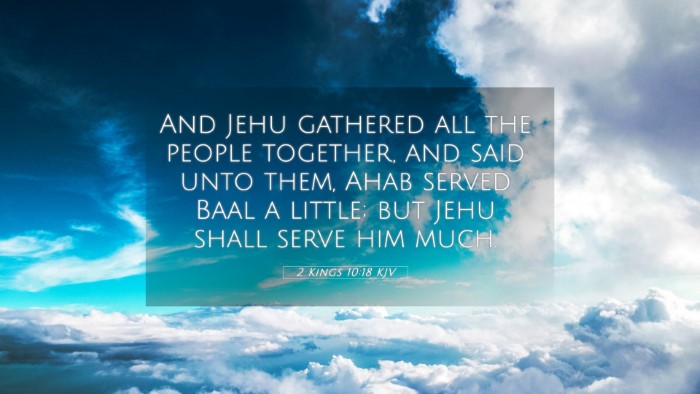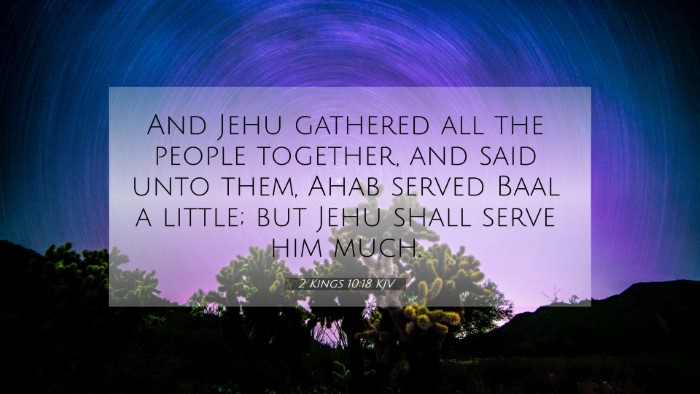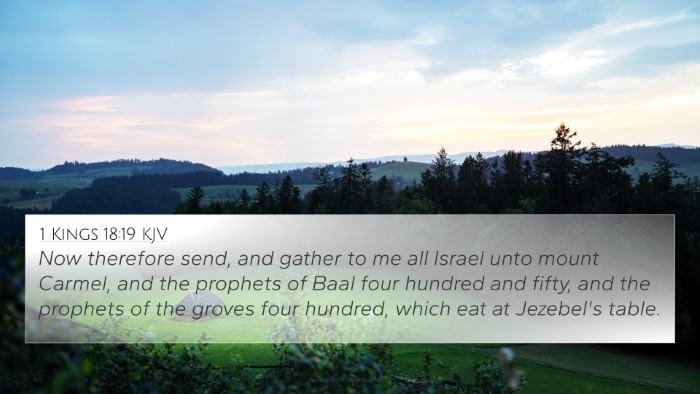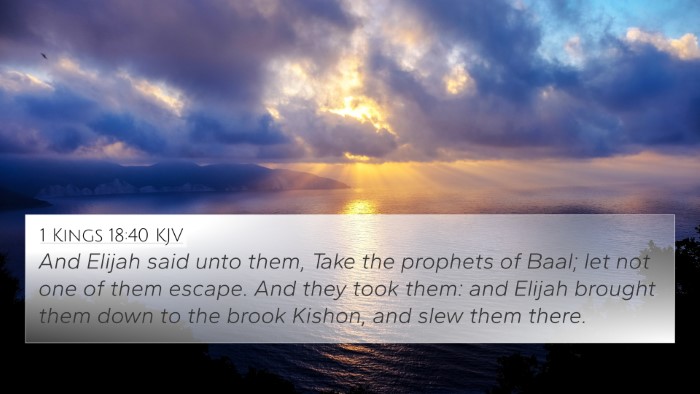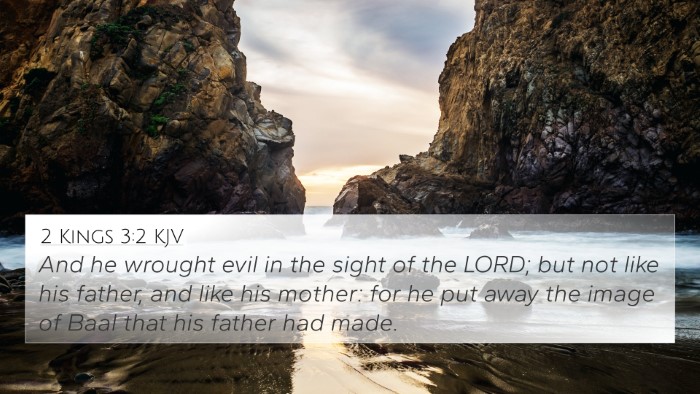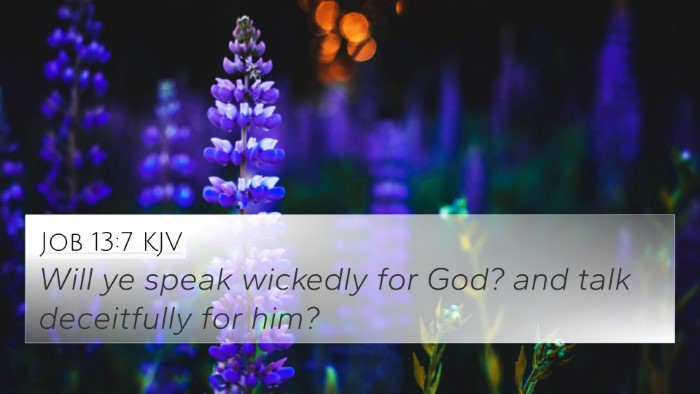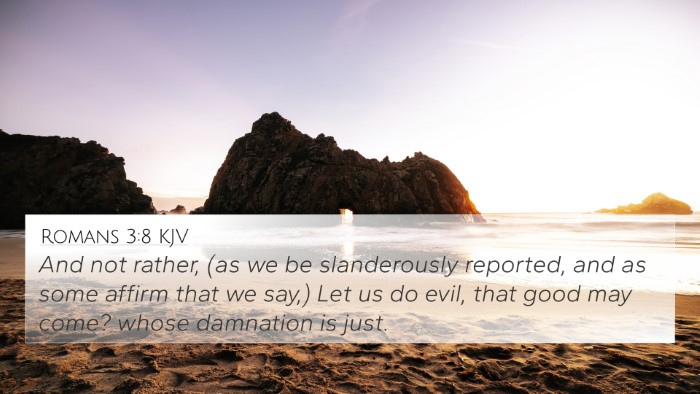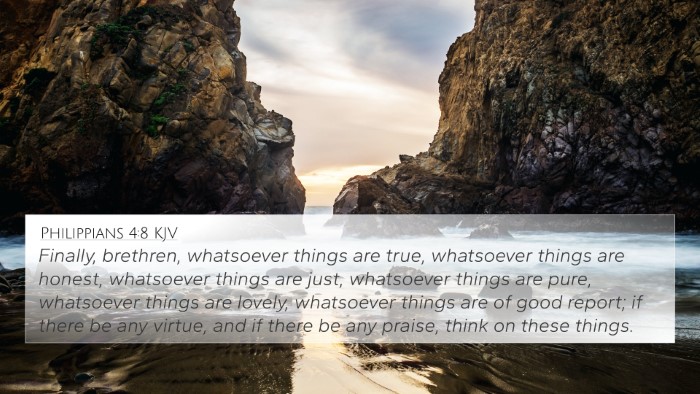Understanding 2 Kings 10:18
Verse: "Then Jehu gathered all the people together, and said unto them, Ahab served Baal a little; but Jehu shall serve him much." (2 Kings 10:18)
Summary of Insights
This passage illustrates Jehu's effort to unify the people under his leadership by portraying a stark contrast between the worship of Baal by King Ahab and his own dedication to the worship of Baal. The focus here is on the strategic means of Jehu's political maneuvering while serving God’s purpose in purging Baal worship from Israel.
Commentary Insights
-
Matthew Henry's Commentary:
Henry notes that Jehu cleverly used the people’s prior association and worship of Baal to fuel his own agenda. He emphasizes Jehu's role as an instrument of God's judgment against the house of Ahab and the prevalent idolatry in Israel. According to Henry, Jehu's declaration serves to draw the people's loyalty away from Ahab and towards his own leadership, while simultaneously making a critical statement about the extent of Baal's influence.
-
Albert Barnes' Commentary:
Barnes provides further context about Jehu’s zeal and the political implications of his statement. He points out that Jehu’s reference to Ahab presents Baal worship as an insignificant, yet consuming fire among the Israelites. This establishes an immediate need for a more vigorous worship in contrast to Ahab's half-hearted service, aiming to ignite fervor among the people to support Jehu's new regime. Barnes suggests that Jehu's intention was also to assert his divine appointment as king.
-
Adam Clarke's Commentary:
Clarke delves into the implications of loyalty and service. He remarks on the use of the term “serve,” suggesting that Jehu was inviting the people to not only abandon Ahab’s worship but to follow him passionately in his campaign against Baal. Clarke notes that this verse encapsulates the shift in worship dynamics which Jehu sought to establish, denoting his reign as one marked by an intensified opposition to idolatry.
Bible Verse Cross-References
The following verses provide inter-Biblical dialogue that enriches the understanding of 2 Kings 10:18:
- 1 Kings 16:30-33 - Discusses Ahab's promotion of Baal worship, setting the stage for understanding Jehu's opposition.
- 2 Kings 9:6-7 - The anointing of Jehu by the prophet Elisha to destroy the house of Ahab.
- Exodus 20:3-5 - The commandment against idolatry, contrasting with the actions of Ahab and the people of Israel.
- 2 Chronicles 22:3 - Highlights the wicked influence of Ahaziah's mother, leading to a culture of Baal worship that Jehu aims to dismantle.
- 2 Kings 10:19 - Details how Jehu uses the gathering to lead the people further into worshiping Baal, ironically amidst proclaiming his own service to Baal.
- Hosea 1:4-5 - Prophecies about God's judgment against the house of Jehu due to the worship of idols.
- Josh 24:14-15 - A call to serve the Lord, framing Jehu's declaration in a deeper spiritual context.
- 1 Peter 5:8 - A warning about being sober-minded while navigating political and spiritual challenges.
- Galatians 5:19-21 - Discusses the works of the flesh including idolatry, which would be in direct conflict with Jehu's mission.
- Matthew 6:24 - The principle that one cannot serve two masters, marking the call to loyalty emphasized by Jehu.
Thematic Connections
This verse serves as a pivotal point in the larger narrative of Israel's struggle with idolatry and the changing political landscape. The themes of leadership, loyalty, and reformation emerge prominently in Jehu's proclamation, stirring a deeper reflection on the impact of one's service to God versus idols.
Conclusion
In exploring 2 Kings 10:18, the connection between Israel's history of worship and Jehu's reign is apparent. Through combining insights from prominent public domain commentaries, we see the multilayered meaning of this declaration and the shift it represents. This verse not only invites us to consider the implications of leadership but also challenges believers to examine their own allegiance to God in the face of societal pressures.

